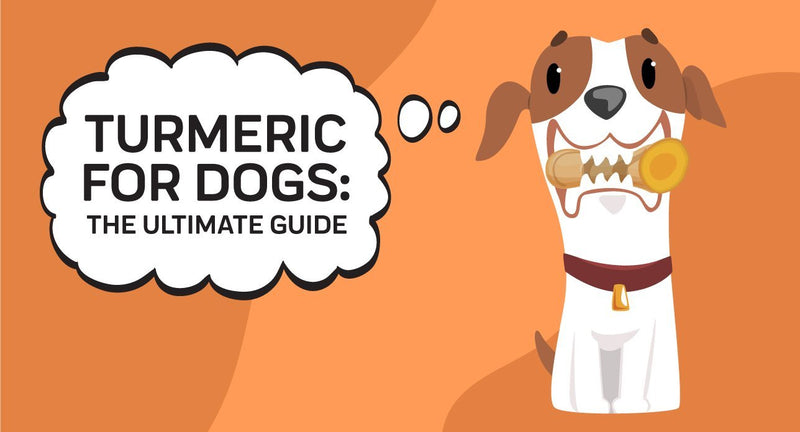When our furry family members become ill and suffer from inflammation, it can be a terrifying experience. Making sure to get them to the vet right away is a surefire way to help, and it can ease a lot of the tension of the unknown!
However, you may soon find that other anxieties start to pop up after your veterinary visit. With so many medications, you might wonder what exactly they are, how they can help, or how adverse effects of new medication could leave your dog feeling worse than before.
A common prescription given in veterinary medicine for dogs is a corticosteroid like prednisone or prednisolone.
While prednisone and prednisolone are popular in veterinary medication, they still come with some risks that are worth investigating! For example, systemic fungal infections can be made worse by prednisone/prednisolone, and dogs who are allergic to the medication should obviously not take it.
Let's break down the uses and serious side effects in dogs of prednisone and prednisolone and explore natural options to help your pets.
- Breaking Down Prednisone and Prednisolone For Dogs
- What Are Steroids/Corticosteroids?
- Looking At Prednisolone
- Using Prednisone For Dogs, How Do You Use It?
- What Is Prednisone For?
- What Side Effects Can Occur When Taking Prednisone and Prednisolone?
- How It Works Alongside Other Medications
- Consider A Natural Prednisone Alternative
- CBD For Dogs
- Top CBD Products
- Using CBD Oil For Dogs
- How Can It Help?
- Other Natural Options
- The Final Verdict

Breaking Down Prednisone and Prednisolone For Dogs
Prednisone and prednisolone are synthetic glucocorticoids used in a variety of disorders involving inflammatory and autoimmune processes.
While prednisone and prednisolone are both are used to treat the same diseases, they are a bit different.
Prednisone is what's known as a synthetic corticosteroid, and it's one that might be prescribed by your veterinarian as treatment. This is also an option used to treat a variety of human illnesses. It's a key medication for bringing down inflammation in pets and humans alike.

Prednisone can do a lot for pets, and we'll take a look at how that happens in this article. Prednisolone is the active metabolite of prednisone. It can cross the cellular membrane and is also used for its anti inflammatory properties.
Prednisone and prednisolone are both powerful immunosuppressants that can help the body fight against potentially life-threatening side effects. However, they should not be used as a treatment for dogs with viral infections.
While these drugs can be effective at treating some of the symptoms of a viral infection, they will also suppress the dog's immune system, making them more susceptible to other illnesses.
What Are Steroids/Corticosteroids?
Steroids and corticosteroids are essentially the same. They are artificial drugs, which are made to be similar to the corticosteroids produced naturally in the body. It's important to keep in mind that the drugs prescribed by a doctor like prednisone and prednisolone are not the same as those used illegally.

Prednisone or prednisolone for dogs addresses many issues including their immune system response, metabolism, stress response, and more. Prednisone is made to replace the naturally-created cortisol when your dog is not feeling well and cannot create enough of the hormone.
Cats, however, do not have a strong enough liver to process these drugs and should not take prednisone or prednisolone as medication.
Looking At Prednisolone
Both prednisolone and prednisone are examples of a corticosteroid, so they are both used for the treatment of issues that can create inflammation. These can also include simply helping to keep your dog's immune system regulated. That said, there is a key difference in how the two options are processed.
Prednisone is typically processed in the liver, which allows it to be converted to prednisolone. However, if your dog has liver issues or liver disease of any sort, then a vet will be likely to choose a dose of prednisolone over prednisone for dogs, which can ensure it is easily processed.

It's generally not a good idea to make the liver work harder when it's already having problems. As a result, it's worth looking into prednisolone for dogs with weakened livers.
But remember, cats have weaker livers than dogs and prednisone cannot be converted to prednisolone in their small bodies.
Using Prednisone For Dogs, How Do You Use It?
Typically, professionals recommend that you only use prednisone or prednisolone for dogs on a short-term basis as cortisol replacement. There can be negative consequences associated with long-term steroid use such as liver or kidney disease.
The idea is essentially to use enough for it to work, but the smallest amount possible for your dog to avoid serious side effects.
That said, it's important to keep in mind that even a small dose of prednisone on a daily basis can have negative effects.

If you're using prednisone for dogs, and your dog hasn't received it before, then it's exceedingly important to keep a close watch on them for negative reactions.
A standard dosage of prednisone and most cortisol at 0.25 mg per pound is often used for reducing the symptoms of allergies. A dosage of around 0.5mg - 1mg per pound is used for anti-inflammatory purposes, depending on the desired results.
However, it's going to be up to your vet to determine and prescribe prednisone in the correct dosage for your furry friend, as well as guide you through how to help your dog take a dose of prednisone. You'll also want to avoid missing doses, as it can lessen the effect.
It's best to provide the next dose as soon as possible until your vet tells you to stop.
It's also wise to remember that prednisone shouldn't be used on a long-term basis. There are other options to seek out if your dog has a hormone deficiency that might require a steroid.
What Is Prednisone For?
Prednisolone and prescribed prednisone for dogs can be used in a number of ways, for a variety of situations.

These can include things like:
- Autoimmune diseases
- Lupus or Asthma
- Allergies
- Arthritis of the joints
- Cushing's Disease
- Anaphylactic shock
- Central Nervous System disorders
- Liver problems
Prednisone and prednisolone are often used to relieve inflammation and swelling, and they can be effective in treating liver dysfunction, spinal cord trauma, and autoimmune diseases such as lupus and autoimmune hemolytic anemia. Prednisone and prednisolone are available both in tablet and liquid forms. If you're thinking about giving your dog prednisone or prednisolone, talk to your veterinarian first to see if this is the right medication for your pet.
There are plenty more uses for prednisone and prednisolone, but typically your veterinarian will know exactly when it should be used, so make sure to heed their advice. For the most part, prednisone doesn't take long to get working, which is a major convenience.
Addison’s Disease has serious consequences for dogs. Addison’s Disease occurs when the adrenal glands fail to produce the hormones that they are in charge of in the body.
The adrenal glands are supposed to produce steroids on their own, but this disease requires drugs like prednisone or prednisolone to supplement the failing adrenal glands.
What Side Effects Can Occur When Taking Prednisone and Prednisolone?

Short-Term Side Effects
Just like medications that humans take, side effects in dogs are real, dangerous, and life-threatening.
Side effects of Prednisone in dogs can include:
- Panting
- Vomiting
- Diarrhea
- Increased hunger
- Energy loss
- Increased urination
- Hair loss
- Behavioral changes
- Fungal infections
- Increased thirst
- Skin infection
- Weight gain
Long-Term Side Effects of Prednisone
Generally speaking, prednisone for dogs is only prescribed for a short time due to the increased risk of side effects. While prednisone is generally safe, there are some potential side effects that can occur with long-term use. These include elevated liver enzymes, diabetes mellitus, and allergic reactions. For this reason, prednisone is typically only prescribed for short-term use.
If for any reason your veterinarian may want to use prednisone long-term to treat Addison's Disease, for example, then frequent trips to visit the vet will be needed to make sure it isn't having any serious effects.
Potential side effects of high doses and long term use of prednisone in dogs:
- Development of Cushing's Disease or Diabetes
- Changes in pet behavior
- Weakness or lethargy
- Heightened infection risk
- Urinary Tract Infections
- Inhibited growth
- Slowed healing
- Weight gain
- Digestive tract ulceration
- Can include increased thirst / increased appetite
Pets can also be in danger of itchy skin and vomiting diarrhea. You should also check whether their urination increased over the time they used prednisone and prednisolone.
If you need a deeper understanding of how long pets can remain on prednisone, bring up risks of higher doses and extended time frames with your vet.
How It Works Alongside Other Medications
If your dog is given prednisone, then you'll absolutely want to make sure your vet knows of any other medications that you might give your pet.

Otherwise, both prednisolone and prednisone can have some harmful effects and allergic reactions when they are mixed with the wrong drug in high doses. Some common drug interactions include increased risk of gastrointestinal ulcers, high blood pressure, and suppressed immune function.
Some medications to look out for are:
- Insulin
- Anti-inflammatories that are non-steroid based
- Diuretics
- Digoxin
- Other steroid medications
- Phenobarbital
- Ketoconazole
- Mitotane
In addition, keep in mind that prednisone for dogs can cause vaccinations to be less effective. Check with your vet to make sure this doesn't cause problems if you give your dog prednisone.
Consider A Natural Prednisone Alternative
When you're looking for something that can treat your dog with inflammation or other more common issues, there are a lot of natural resources out there that can help.
Check these drug-free options out, and discuss them with your vet to see if they're the right choice for your pet!
CBD For Dogs
CBD treatment can be incredible for just about everyone, including your pet. A PurCBD+ dose for dogs can provide your pet with a lot of great benefits, including assisting in easing a stressed central nervous system, reducing physical pain, and even helping with a reduction in seizures.
Though it is still a relatively new route in veterinary medicine, scientists are already beginning to explore the benefits a CBD dosage can provide. On top of that, it's completely natural, which means there is an extremely low risk of overdose.
Top CBD Products
A dose of Innovet's Hemp Dog Treats can help your dog in so many ways, and they find them delicious! In addition, CBD dosage can provide some help to limit the amount of non-natural medications your dog needs.
CBD Can Treat Many Issues Drug-Free:
- A dull coat
- Itchy skin
- Dandruff and excessive shedding
- Allergies
- Damaged paw pads
Using CBD Oil For Dogs
Another great option for keeping your pet healthy and happy is our PurCBD+ PhytoCannaBinoiD Oil.
This product is made to absorb easily and work quickly to both calm current symptoms and may help prevent future pain from occurring.
It's truly a great option for inflammation, skin issues, and other immune-mediated diseases. Plus it's a lower-cost option than most medication.
CBD is imbued with anti-inflammatory properties but does not suppress the immune system like harsh drugs. CBD dosage is used to ease illness and disease of many forms in both cats and dogs.
How Can It Help?
Decreasing Anxiety and Stress
CBD treatment is a great veterinarian-approved way to help your dog with stress and anxiety in a highly natural way. It allows you to avoid the side effects of pet anxiety medications and allow your dog to feel calmer at any dosage.
Physical Pain
CBD is also fantastic for helping relieve symptoms of your dog's physical pain.
Whether it's arthritis, cancer symptoms, skin dermatitis, back pain, or other diseases, it's a great option to leave your pet feeling better without drugs!
Other Natural Options
While a quick dose of CBD is the top option, there are plenty of other helpful natural resources out there to help out dogs!
The more information you have on your options, the better prepared you'll be when you talk to your veterinarian about alternatives to drugs. These options are also great for cats!
Change In Diet
One of the top choices out there is a raw food diet, which allows dogs to eat similarly to what they'd have in the wild.
This allows them the greatest potential for natural wound healing and a healthy way to mediate increased appetite.
Turmeric
Turmeric is a fantastic option for getting a handle on any inflammation your pet may be experiencing.
There's a good reason it's one of the ingredients in our Hemp Dog Treats.
Echinacea
Echinacea is a great drug-free choice for dogs that need some help with their overall immune system. It's all-natural and quite effective.
However, it's best to use it off and on, because your dog's body can acclimate to it and stop getting the effects.
Ginger
Ginger is a blocker for leukotriene and prostaglandin, which are inflammatory chemicals.
As a result, it's ideal for swelling and painful symptoms. Because ginger also has natural anti-inflammatory properties, it cannot suppress the immune system in dogs the way prednisone and prednisolone can.
The Final Verdict
Whether you choose natural solutions or a drug like prednisone and prednisolone, we can all agree that your dog's health is at the top of the priority list.
That's why it's extremely important to be armed with information about common medications and the increased risk over natural treatments they can have.
A natural way of healing is absolutely worth trying out, and it can often avoid unpleasant side effects for your beloved dogs and cats.


















